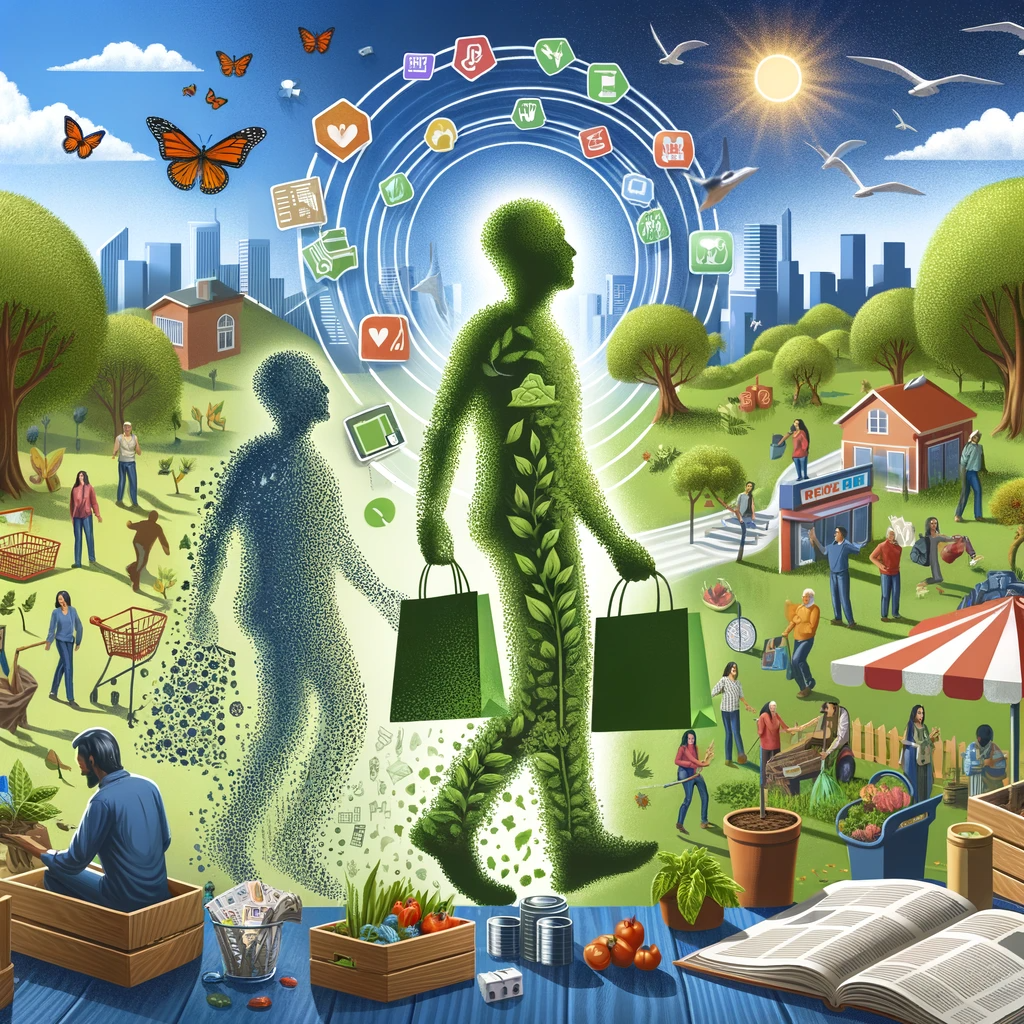In an era defined by rapid consumerism and individualistic pursuits, Jon Alexander’s seminal work, “Citizens,” emerges as a beacon of transformative thought, challenging the conventional narrative of our societal roles. It nudges us towards a more engaged, responsible, and collective way of thinking and innovating. This blog post blends the essence of “Citizens” with new insights, offering a pragmatic blueprint for individuals and businesses to adopt this revolutionary model in our daily lives and practices.
Reimagining Our Societal Roles
Our current society, inundated with messages reinforcing our consumer identity, faces critical issues – loneliness, mental health crises, pervasive inequality, and ecological breakdown. The Consumer narrative, which limits our agency to mere choice among provided options, is inadequate to address these challenges.
“Citizens” marks a profound paradigm shift: from viewing ourselves merely as consumers to recognizing our potential as active citizens. Alexander traces the evolution from the 19th-century concept of the ‘Subject’ – passive, obedient, and conforming – to the 20th-century ‘Consumer’, whose self-interest was seen as contributing to the collective good. Now, as the Consumer model shows its flaws, we are on the cusp of a new era – that of the Citizen.
From Consumption to Contribution
The consumer identity, rooted in our modern psyche, positions us as economic entities. However, the citizen-centric approach Alexander proposes goes beyond this. It’s about contributing to society, participating in areas we are passionate about, and supporting businesses that align with these values. It encourages a shift from the freedom of mere choice to the empowerment of active participation and creation.
As the Consumer story collapses, we witness the rise of the Citizen. Unlike the obedient Subject or the self-serving Consumer, the Citizen is involved, collaborative, and empowered to shape the world for the better. This “Citizen Shift” is driven by two key factors:
Inherent Human Nature: Deep within us lies the innate propensity to be Citizens. Historical and evolutionary evidence suggests that collaboration and empathy have been as influential as competition and status in shaping human progress.
Technological Influence: The internet, unlike the one-to-many medium of television, offers a many-to-many platform, enabling wider participation in creating and shaping societal narratives.
The Pillars of Citizenship
Being a citizen, as Alexander argues, involves:
Active Engagement: Participating in community and democratic processes, not just as consumers choosing from a menu of options, but as contributors to the societal narrative.
Collective Responsibility: Adopting a mindset where our choices are not only for personal gain but for the betterment of society as a whole.
Ethical Living: Prioritizing communal well-being in our daily decisions, transcending the traditional consumer mindset.
Transforming Business Practices
At the heart of this philosophy is crafting a mission-focused business model. Alexander posits that true success incorporates societal and environmental impacts. It challenges the traditional notion of profit being the primary driver, arguing for a model where businesses are motivated by their mission, trusting that their community will support their endeavors.
The Business of Being Citizens
Businesses are called to broaden their success metrics, evaluating their impact on society and the environment. This means moving beyond shareholder-centric models to consider the well-being of all stakeholders. Alexander provides evidence that ethical, citizen-centric businesses can be profitable through enhanced brand loyalty, employee satisfaction, innovative edge, and risk mitigation.
For Individuals: Embracing the Citizen Mindset
Adopting a citizen-centric approach in our personal lives means supporting businesses that pursue missions over profits. It involves community empowerment and democratic engagement, where companies committed to their communities structure the democratic development of their innovations.
Overcoming Challenges: Questions to Reflect On
Here are some reflective questions to guide our transition toward a more mission-driven approach:
Identifying Core Mission: What societal or environmental need does my business address beyond making a profit?
Customer and Industry Engagement: How can I involve customers and collaborate with like-minded businesses for greater societal impact?
Employee and Community Involvement: How can employee participation and community impact be enhanced in my business operations?
Ethical and Sustainable Practices: How can my business implement sustainable practices and ensure an ethical supply chain?
Transparency and Accountability: How can we build trust and hold ourselves accountable to our mission?
Our Collective Journey Towards Better Citizenship
Jon Alexander’s “Citizens” is more than a book; it’s a call to action. It urges us to move beyond mere consumption and contribute positively to the world, supporting acts of heroism in our communities and businesses. Let’s commit to being active participants in this transformative journey, redefining our roles and reshaping our businesses for a better society. The future awaits a new breed of citizens – let’s be part of it.
References
- Alexander, J. “Citizens.” Exploring the Shift from Consumer to Active Citizen.
- History of Societal Roles: The Transition from Subjects to Consumers in the 20th Century.
- The Role of Technology in Societal Change: The Influence of the Internet and Digital Media.
- Social Psychology Studies: The Impact of the Consumer Identity on Community Engagement and Environmental Responsibility.
- Case Study: Brewdog’s Eco-Friendly Practices and Community Engagement.
- Case Study: The Guardian’s Shift from Information Provider to Community Empowerer.
- Evolutionary Psychology: Collaboration and Empathy in Human Development.
- McLuhan, M. “The Medium is the Message.” Understanding Media: The Extensions of Man.
- Participatory Democracy: Global Examples of Citizens’ Assemblies and Budgeting.
- Public Sector Innovations: Government’s Role in Facilitating Citizen Participation.
- The Third Sector Evolution: Changing Roles of Charities and Non-Profits in Empowering Citizens.
- Economic and Social Impact Studies: The Profitability and Sustainability of Ethical Business Practices.
- Consumerism and Its Impact on Society: Analysis of Current Social Issues Stemming from Consumer-Centric Models.

